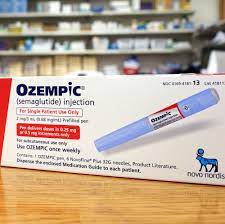As Ozempic use grows, so do reports of possible mental health side effects.
Ozempic, approved by the Food and Drug Administration for Type 2 diabetes, is racking up blockbuster sales because many people are taking it to lose weight. As more people try it, reports to the FDA about possible side effects are rising.
Mario Tama/Getty Images
Nearly three months into taking Ozempic for diabetes, Jenny Kent had already lost 12 pounds, and her blood sugar numbers were looking better than they had in a while.
Ozempic, the injectable drug approved for Type 2 diabetes, has taken the world by storm.
Despite not being approved by the Food and Drug Administration for weight loss, Ozempic has prompted people on TikTok and Instagram to speculate about which stars have used it to shed pounds seemingly overnight.
The drug has become so popular that it’s been in short supply for much of the past year.
But for Kent something else changed after she started taking Ozempic.
“I was just constantly in a state of being overwhelmed,” says Kent. “So my response to that was just I was just crying all the time. Sobbing, crying … I still didn’t put it together, so I kept … taking my injections.”
She’s one of many people taking Ozempic and related drugs who describe mental health problems. But that side effect isn’t mentioned in Ozempic’s instructions for use, or drug label. Are the problems a coincidence or related to the drug?
European regulators investigate mental health reports
In July, the European Medicines Agency said that it was looking into the risk of thoughts of self-harm and suicidal thoughts with the use of Ozempic and similar drugs. As of July 11, the regulator, Europe’s FDA, was evaluating more than 150 reports.
The FDA hasn’t taken that step. For now, the agency is monitoring the situation. “We continue to conclude that the benefits of these medications outweigh their risks when they are used according to the FDA approved labeling,” spokesperson Chanapa Tantibanchachai said in an email to NPR. She noted that weight-loss drug Wegovy, which contains the same active ingredient as Ozempic, semaglutide, includes a warning about suicidal thoughts on its label.
NPR analyzed the FDA’s adverse event reporting system, or FAERS, and learned that the agency has received 489 reports of patients experiencing anxiety, depression or suicidal thoughts while taking semaglutide drugs, including Ozempic, Wegovy and Rybelsus.
In 96 of those reports, the patient had suicidal thoughts. Five of them died. It isn’t known if Ozempic and the other drugs caused the mental health problems. The FDA database can flag questions but isn’t designed to answer them.
“It’s a passive surveillance system where people like you and me – patients, caregivers, medical providers – can report a safety event if they feel that that patient has suffered an adverse outcome from a drug that they had been on,” says Rishi Desai, an assistant professor at Harvard Medical School who studies drug side effects.
The FDA database is voluntary, unverified by the agency and may have duplicates. As a result, it has no denominator or comparison group to tease out whether adverse events – like suicidal thoughts – are the result of a drug or something else.






































